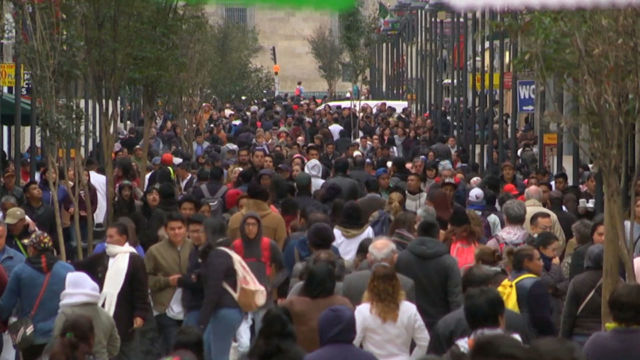Adjusting to their new life in Mexico can be overwhelming for returning migrants. Although they had no said in being taken away to the United States as children, back here in their original country, they face discrimination on a daily basis.
Yet, one Mexican organization is seeking to give these individuals a helping hand. Founded last year, Hola Code is teaching essential programming skills to 22 U.S. deportees to help them to find work.
CGTN’s Alasdair Baverstock reports.
After growing up in Mundelein, Illinois, Eddy Barranon was deported to Mexico City last year. The 21 year-old can’t remember life in Mexico. When he landed in the nation’s capital he knew no one.
“It was kinda scary at the beginning. My whole family is over there in the States, so I felt lonely and lost,” said DACA deportee Eduardo Barranon.
DACA was the U.S. immigration policy that used to protect young undocumented immigrants from deportation. The Trump administration let it lapse, forcing supporters to take enforcement throuth the court system.
Back home in Mexico City, Barranon said some people don’t see him as a real Mexican.
“You know I was raised in the United States and I have the American culture, said Barranon. “I come back to Mexico and people start saying, ‘Oh they think they’re Americans, they should go back, why are they even back here ”
Eddy was one of over 13,000 non-criminal deportations from the U.S. in 2017-many of them young immigrants connected to DACA. They now find themselves alone in Mexico City.
Adjusting to their new life in Mexico can be overwhelming for returning migrants. Although they had no say in being taken away to the United States as children, back here in their original country, they face discrimination on a daily basis.
Yet, one Mexican organization is seeking to give these individuals a helping hand.
Founded last year, Hola Code is teaching essential programming skills to 22 U.S. deportees to help them to find work.
“So, the current trends of migration around the world, they’re more about being a little bit more closed, not open to other nations,” said Hola Code Founder Marcela Torres. “But, I see migration as a positive thing. And that is sort of what we want to reflect and show through Hola Code, that migration is something very positive. That we can benefit from, we can create from, we can innovate from. And that this change of cultures and perspectives can have a really good result into a country, a society, and economies.”
The intensive five-month course will equip these individuals with skills in hot demand not only in Mexico but across the world.
For Eddy, it’s a chance at a fresh start with better opportunities than he said he would have had as an illegal immigrant in the U.S.
“Now that I’m back in Mexico and actually being someone, and having a career, it’s awesome,” said Barranon. “It’s something that I never thought I would have because of the chances I didn’t have over there in the United States.”
As Hola Code grows, its alumni will finance it as they move into full-time employment, repaying the $7,000 that the company charges them to learn this life-changing skill.
It’s an operation, the founders said, that is both a solid business and a social responsibility.
Marcela Torres discusses why DACA deportees are finding opportunity in Mexico’s tech sector
CGTN’S Alasdair Baverstock spoke to Marcela Torres about DACA deportees finding opportunity in Mexico’s tech sector.
 CGTN America
CGTN America

